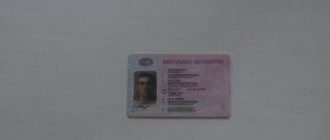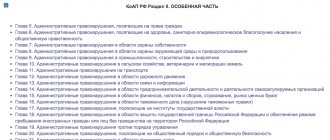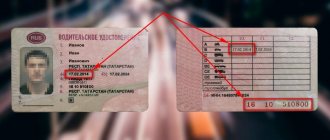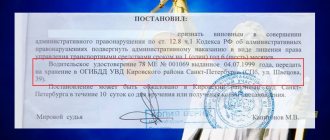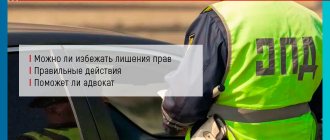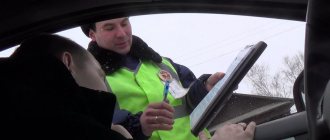If a driver significantly violates traffic rules, his driver's license may be revoked. The process takes place during the trial. Rights can be deprived for up to 3 years, but there are cases when the periods of deprivation of a driver's license are added together and the time period increases to 10, 20 or more years. Under some articles of the law, the amount of punishment varies significantly. If a person is facing a trial for deprivation of a driver’s license, it is important to figure out how to behave competently during the process. A thoughtful approach will allow you to try to reduce the term of imprisonment or avoid punishment altogether.
Why can your driver's license be revoked?
If the driver has violated traffic rules that imply deprivation of a driver’s license, the road inspector will act in accordance with the norms of Federal Law No. 196 of December 10, 1995 “On Road Safety.” He is obliged to draw up a protocol and submit the case to court. Proof of the car owner’s guilt is attached to the document. It may include photo and video evidence, a diagram of the accident, the results of a medical examination and eyewitness testimony. The information is certified by their signatures. The reasons that can lead to the deprivation of a driver's license are enshrined in Chapter 12 of the Code of Administrative Offenses of the Russian Federation.
Attention! If you have any questions, you can chat for free with a lawyer at the bottom of the screen or call Moscow; Saint Petersburg; Free call for all of Russia.
| Reasons for deprivation of a driver's license | |
| Articles of Chapter 12 of the Code of Administrative Offenses of the Russian Federation | Explanation |
| 12.2 | The citizen was driving a car without license plates |
| 12.5 | Driving was carried out in a vehicle on which operational service signs, a signaling device and red lights were illegally installed |
| 12.8 | Driving while drunk |
| 12.9 | The citizen greatly exceeded the established speed limit |
| 12.10 | The citizen neglected the current rules when crossing the railway tracks, or stopped on them |
| 12.15 | The driver entered the oncoming lane in areas prohibited for overtaking |
| 12.16 | The driver was driving against the direction of traffic on a one-way road |
| 12.21 | Violations were committed during the transportation of goods |
| 12.24 | A citizen was the culprit of an accident, as a result of which people received mild to moderate injuries |
| 12.26—12.27 | The citizen refused to undergo a medical examination at the time of the incident |
| 12.27 | The driver left the scene of the accident |
Why can you deprive your right to drive a vehicle?
More than 10 offenses lead to deprivation of a driver’s license (Chapter 12 of the Code of Administrative Offenses of the Russian Federation):
- driving while drunk;
- refusal to undergo a medical examination to determine the degree of alcohol intoxication of the driver;
- driving in the oncoming lane;
- movement along a one-way road in the opposite direction;
- driving without license plates or with false plates;
- driving vehicles with illegally installed signaling devices or special signs;
- illegal speeding;
- improper transportation of dangerous goods;
- stop at a railway crossing;
- fleeing the scene of an accident;
- caused by an accident with minor injuries;
- Road accident with moderate severity of outcome.
If, in the case of improperly organized cargo transportation, the driver can only be fined, then if there is alcohol in the blood, they will most likely be deprived of their license.
Video: Revocation of a driver's license. What not to do on the road?
Normative base
First of all, a citizen must know the traffic rules of the Russian Federation. Here are the driving rules that must be followed when driving on the road. If a person neglects the rules, he may be deprived of his driver's license in court.
Additionally, it is worth familiarizing yourself with the norms of the Code of Administrative Offenses of the Russian Federation. In particular, it is recommended to study Chapter 12. This sets out the punishment to which a driver who neglects the rules may be subjected. The Administrative Code reflects situations in which a citizen may be deprived of his driver's license in court.
It is also necessary to know the provisions of Federal Law No. 196 of December 10, 1995 “On Road Traffic Safety”. The regulatory legal act reflects the rules for allowing a citizen to drive a vehicle, records the actions of a traffic police officer in the event of an incident, reflects the procedure for prohibiting the operation of a car and approves the rights and obligations of road users.
Procedure for considering the case
If an offense has occurred, the inspector will draw up a protocol, prepare accompanying documentation and submit the case of deprivation of the driver's license for consideration in court. The current situation will be reviewed within 15 days. A summons is then sent to the offender.
In practice, the summons does not always reach the driver in a timely manner. If the notification is not received, there is a risk of missing the meeting. In this case, the citizen will not have a chance to challenge the offense and the deprivation of his driver’s license. To avoid finding yourself in such a situation, it is recommended to independently find out the date of the trial in court. To do this, you should visit the traffic police department yourself.
You can also find out the date of consideration of the case on deprivation of a driver’s license through the website of the State Traffic Inspectorate. To obtain information, you will need to go to the official traffic police page on the Internet and scroll down the page. Here is a list of online services. You must click on Driver Check. The system will redirect the citizen to a page with an online form. Here you must indicate the series and number of the driver's license and the date of issue. Then you need to click on the Request Verification item.
Procedure for considering a case in court
So, the traffic police inspector sends the protocol and all accompanying documents to the judicial authorities.
The protocol is reviewed within 15 days, after which the driver will receive a summons from the court.
You should not be happy if you have not received a summons, although you are familiar with the protocol drawn up by the traffic police officer. Surely, the notice of the trial simply did not reach you.
Of course, you can skip the trial, but then you will not have a chance to challenge your offense.
To prevent this from happening, find out the court date yourself. For this purpose, you can contact the traffic police department in person or go to the State Traffic Inspectorate website and enter the driver’s license details into the search.
Venue of the trial
Cases of seizure of driver's licenses are considered by magistrates.
The protocol is sent to the court department that is closer to the place of the offense or accident. But if the car owner is not satisfied with this, then he has the right to file a petition to transfer the consideration of his case to the place of registration.
Such a request can be included in the protocol drawn up by the traffic police inspector at the place of detention. You can also send a letter and statement to the court with the same request.
Case review and trial
After the protocol reaches the court, the magistrate accepts all materials collected by the traffic police inspector for production. He sets the date and time for the trial and notifies the offender about this through a summons.
During the consideration of the case, the car owner has every right to study all the investigation materials in order to present his explanations and evidence to the court. How should a driver behave in court?
Before the start of the proceedings, the judge is obliged to explain the rights and ask whether the driver has a petition. If there is a written explanation, then you need to submit a petition to include it in the case materials.
Next, you should orally present your position and the circumstances of the case. The judge will ask the driver questions based on the records.
If you find violations in the protocols or actions of traffic police officers, be sure to point them out to the court.
Often in court, the traffic police officer who drew up the protocol acts as a witness. It is necessary to resist his position, demand clarification on each point, point out violations and in no case make excuses.
File a petition to exclude or invalidate any document if it was drawn up in violation of the law. If any document is missing, you can file a motion to request the required paper and reschedule the trial.
If the judge does not accept the petition, his actions should be appealed.
At the final stage of the trial, you can submit a written request to invite your witnesses and witnesses, if any, to the court.
Even if a decision is made to arrest the rights, it can be appealed . If there is insufficient evidence, the deprivation of rights proceedings will be terminated.
Litigation for deprivation of driver's license
When the protocol is submitted to the court, all materials collected by the traffic police officer are accepted for processing. The magistrate will set a date and time for the trial. The driver will be sent a summons.
The car owner who committed the violation is a full participant in the proceedings. He can study all the materials provided to the court, present his evidence and defend his point of view. When starting the process, the judge will explain to the citizen his rights and ask whether the driver has any petitions. If a citizen has prepared a written explanation of what happened, it is included in the case materials. Then the person must verbally explain his position and the circumstances of what happened. Based on the protocol and additional papers, the judge will ask questions.
If a traffic police officer committed an offense during a stop or communication with a citizen, you must report it. Often the inspector who was involved in drawing up the protocol is brought in as a witness. Experts advise resisting his position and demanding clarification on each point.
You can't make excuses. If any document was drawn up in violation of current legislation, it is worth filing a petition to exclude the document or declare it invalid. If one of the necessary documents for the consideration of the case is missing, you can request it and request a postponement of the trial. If the judge refuses to accept the motion, the action can be appealed.
During the next stage of the proceedings, the citizen has the right to demand that witnesses and witnesses, if any, be invited to court. If a decision is made to revoke your driver's license, you can try to appeal it. If there is insufficient evidence, the proceedings are terminated.
How does the trial for revocation of a driver's license for alcohol intoxication proceed?
If traffic police officers suspect that the driver is intoxicated, an inspection will be carried out. A traffic police officer can do everything independently using a breathalyzer. The action is carried out in the presence of two witnesses. The device must show the results on a display and issue them on paper.
If the driver doubts the test results, he is sent to a medical facility for a full examination. Only a doctor with the appropriate certificates can perform the procedure. Based on the results of the inspection, a report is drawn up. It is prepared in 2 samples, which are attached to the case materials.
The papers are then sent to the court. Proceedings regarding the deprivation of a driver's license will follow the same pattern as in the classic situation. A citizen has the right to request that witnesses be brought in and to point out inconsistencies between the inspector’s testimony and the case materials. It is important to first study all documents that supplement the protocol. If the court rejects any petition, the citizen can appeal its decision by appealing to a higher authority.
How does the trial for deprivation of a driver's license for driving into the oncoming lane work?
If a driver violates traffic rules and drives into oncoming traffic, he may be deprived of his license for a period of four to six months. Such information is contained in Article 12.15 of the Code of Administrative Offenses of the Russian Federation. Repeated violation will result in an increase in the sentence to 1 year. However, the punishment may be replaced by a fine.
Having stopped the driver, the inspector will draw up a report. Then the traffic police commission examines the case. She may decide to deprive her of her license or impose a fine. If the first option is chosen, the case goes to trial. The judge considers the circumstances of the case and decides to impose a fine or deprivation of rights for driving into the oncoming lane.
Who reviews cases of driver's license revocation?
First, materials about a gross violation of traffic rules by the driver of a vehicle are drawn up by a traffic police officer.
Then, in accordance with Part 1 of Article 28.8 of the Code of Administrative Offenses of the Russian Federation, within three days, the collected materials must be sent to the court at the offender’s place of residence, if the driver has expressed such a desire.
Otherwise, the materials may go to the court, which is geographically closer to the place where the traffic violation was committed. According to the rules of jurisdiction, such a case will go before a magistrate.
The driver’s desire to send the materials of the administrative case to his place of residence can be formalized either in a separate document or with a reference to this in the protocol itself.
This norm is directly stated in administrative legislation: part 1 of article 29.5, part 1 of article 24.4. Code of Administrative Offences. In addition, this norm is duplicated in paragraph 113 of the departmental order of the Ministry of Internal Affairs of the Russian Federation No. 185.
The offender will be sent a summons indicating the date and time of consideration of the administrative case.
If you, as a driver, ignore a summons to court, this will not mean that the case will not be considered in your absence. The failure of an offender to appear in court without a good reason does not prevent the consideration of the case and the adoption of a decision in accordance with the requirements of the sanction of the article.
Therefore, you should defend your position in court, involving witnesses on your side who can confirm your version of what happened.
How to get your license back after deprivation? Read about the revocation of a driver's license for alcohol here.
Find out how to win a case in court regarding the deprivation of rights for driving into oncoming traffic at the link:
On the part of the prosecution, the traffic police officer who compiled the administrative protocol may be invited as a witness.
In accordance with legal requirements, a decision on the case must be made within two months. If a court decision was not made within such a time period, then punishment cannot be applied to the driver.
A judge, when considering an administrative case, may decide to impose an administrative fine on the driver. Or it may make a decision to revoke your driver’s license.
In this case, the period of deprivation of rights will be calculated from the moment the driver submits his license to the traffic police authority, which is responsible for storing such documents. If you do not agree with the court’s decision to deprive of rights, then within 10 days from the date of announcement of the decision in the case, appeal it to a higher court.
How does the trial for deprivation of a driver's license for crossing a solid line proceed?
If a driver crosses a solid line, he may face a warning or a fine of up to 5,000 rubles. If you are overtaken, your driver's license may be revoked. The confiscation of the certificate is carried out after the trial.
The consideration of the case is carried out according to the classical scheme. The compiled protocol is submitted to the court. During the proceedings, the circumstances of the case and the testimony of witnesses and participants in the incident are taken into account. A final decision is then made. It can be appealed by appealing to higher courts.
What does the court's decision depend on?
The driver is found guilty if his offense is proven. A citizen can try to refute the inspector's arguments by providing relevant evidence. If the judge has doubts about guilt, he can acquit the driver. If there is obvious evidence of innocence, the proceedings are terminated. This rule is enshrined in Article 29.9 of the Code of Administrative Offenses of the Russian Federation. If errors were made during the arrest or registration of the protocol, this may affect the court decision. The following factors may also affect the proceedings:
- providing photo and video evidence confirming the citizen’s innocence or exonerating him;
- admission of one’s own guilt and proof that the offense was committed unintentionally;
- presence of a clean driving record;
- engaging a good car lawyer in the proceedings;
- there were errors in the protocol;
- the report was drawn up without the presence of the person responsible for the incident;
- the person was able to prove that at the time of the incident he was influenced by external factors.
How to behave in court when your driver's license is revoked?
When going to a court hearing to revoke a driver's license, you must give preference to business attire. It is necessary to look clean and tidy. You can't be late. If a citizen arrives later, this is considered disrespect. You must have your passport with you. Additionally, it is worth bringing with you documents related to the case. Experts recommend grabbing a pen and blank sheets of paper. During the proceedings, it may be necessary to file a motion. You need to behave confidently and calmly. Answers to the judge's questions are given in essence. It is necessary to address the person acting in this role using the expressions “Your Honor” and “Dear Court.”
You need to speak loudly, clearly and clearly. There's no need to rush. It is always necessary to answer the essence of the question. Proceedings in cases of deprivation of rights are held in an open manner. A citizen has the right to invite media representatives. It is worth resorting to their help if a person is sure that he did not violate traffic rules and became a victim of a setup. Usually journalists willingly agree to attend meetings. For them, proceedings serve as material for a video or publication. In their presence, the judge will follow all legal procedures and consider the case objectively.
When taking part in the proceedings, a citizen should not try to prove his own innocence, but point out violations committed by traffic police officers in the process of preparing documentation. It is worth focusing attention on all inconsistencies. This confirms the citizen's innocence. If for any reason it is not possible to provide a document confirming the driver’s eligibility, you must draw up a written request to request paper from the relevant authority. At the same time, a motion is filed to postpone the hearing until the document is received. The judge may reject the citizen's claims. However, this gives him a reason to appeal the decision to a higher authority.
You must use only facts. There is no need to give in to emotions. All documents proving the case must be prepared in duplicate. One is sent to court, the second remains in hand. It is recommended to prepare a petition to call witnesses, witnesses and traffic police officers who executed the protocol on deprivation of rights.
How does the magistrate's court for deprivation of rights work?
Each case is unique, but it is possible to identify common stages, and therefore opportunities common to all. We will consider the sequence after the offense has been recorded, i.e. implying that the violation has already been committed and the traffic police report has been drawn up.
Step 1. Sending the protocol and evidence to the court
Part 1 of Article 28.28 of the Code of Administrative Offenses implies the transfer of materials to the court by a traffic police officer within three days from the moment the offense was recorded. All documents related to the case are transferred along with the protocol:
- witness's testimonies;
- medical examinations;
- photo or video materials;
- etc.
Step 2: Review the protocol
The consideration of the case by a judge - the issuance of a Resolution - is carried out within two months from the date of receipt of the protocol (Part 1.1 of Article 29.6 of the Code of Administrative Offenses). It is possible to extend the consideration in complex cases, but no more than for another month (Part 2 of the same article). The extension can be initiated both by the court and the parties to the process.
Step 3. Subpoena
After setting the date for the hearing, the driver against whom the administrative case is being conducted is summoned to the court hearing by summons. The summons is sent via mail.
The next thing that needs to be clearly understood is that the operation of the post office (in this case, the fact of delivery of the summons) does not affect the conduct of the process. If for some reason the driver does not receive a message about the date and location of the hearing, the trial may take place without his presence. In the vast majority of cases, this deprives the possibility of protection and leads to a negative decision - deprivation of rights.
If the driver resorts to the help of a lawyer in revocation of a driver’s license, he will help to find out all the circumstances of the case, incl. and the timing of the trial.
Step 4. Court hearing in an administrative case
Any trial is a complex and multifaceted process. A decision on an administrative offense is made based on a combination of various factors that have both a direct and indirect relationship to the incident.
For example, the court's decision on deprivation is often influenced by such general data as:
- Driving experience.
- Frequency of previous traffic violations.
- Sincere confession.
Compliance with procedural norms when recording an offense is very important. It is through their non-compliance that many cases related to deprivation of rights can be won. A professional auto lawyer will be able to identify and record violations.
What to say in the magistrate's court when depriving of rights?
During the hearing, you should not behave provocatively or interfere with the conduct of the trial. At the same time, you need to know and be able to protect your rights:
- Familiarization with all case materials.
- Notification by the judge of the driver of all his rights and obligations within the framework of the proceedings.
- Request the involvement of your own witnesses, evidence, and explanations.
Petitions must be submitted in writing. During the meeting, the driver will be interviewed orally. In most cases, the traffic police officer who prepared the protocol will act as a witness for the prosecution. There is no need to show aggression towards him or the judge, this is fraught with additional problems. You need to answer questions clearly so that the wording does not suggest double interpretation.
The lawyer defending the driver will be able to prepare him for the hearing, and, if necessary, represent his interests fully.
Step 5. Issuance of a court ruling on deprivation of rights
In this case, the court decision is recorded in a decree. Having weighed all the available facts and evidence, the judge makes a decision on punishment (or lack thereof), which is recorded in this document.
The form of the decision on deprivation of a driver's license is clearly established by law. Based on the norms of Art. 198 of the Code of Civil Procedure of the Russian Federation, the document consists of four main parts: introductory, descriptive, motivational and concluding (resolution) parts. Let's look at each in detail using an example.
Introductory and descriptive parts
Often the introductory part is simply called the “header”. It is where the case number, place of the hearing, parties, judge and his assistants (if involved in the hearing) are indicated. The descriptive part indicates the essence of the case - the claims of the parties, the article of the Code of Administrative Offenses under which the consideration is taking place.
These parts of the resolution look something like this:
Motivational part
This part indicates all the circumstances identified by the court, conclusions and regulatory grounds on which they were made, evidence, etc.
In the example we are considering, this part looks like this:
The operative part
The essence of the decision is indicated here - satisfaction of the claim or refusal, deadlines for appeal, and other necessary information. Continuing the example above, this part looks like this:
It can be seen that in our example everything ended well for the driver, however, without qualified assistance, such cases may not have such a positive outcome.
Step 6. When does the regulation come into force?
You have 10 days to appeal the decision. During this time, the driver deprived of his driving license can file an appeal. If this is not done, the decision comes into force 10 days from the date of the decision.
Step 7. Delivery of the document for storage
A mandatory step, if the decision to deprive the driver's license comes into force, is to hand over the rights for storage to the traffic police. This must be done within 3 days .
What are the consequences of refusing to pass the VU? Firstly, without this, the period of deprivation of rights will not begin to count - its countdown will be suspended. Secondly, the liability for driving with such a license can be even more serious.
What happens if you don't appear in court?
There are no penalties for failure to attend court proceedings regarding the revocation of a driver's license. If the driver does not come to the meeting, the proceedings will be carried out without him. However, the citizen deprives himself of the opportunity to prove his innocence. The decision will be made in accordance with the facts provided by the traffic police officer. Almost always, a driver who neglects to attend the trial is deprived of his license. If a citizen prepares an evidence base, takes an active part in the meeting, and states his position, there is a possibility of winning the case and maintaining the ability to drive a vehicle.
Is it possible to win a court case against deprivation of rights for driving while intoxicated?
Whether vehicle drivers will win in court for deprivation of their rights depends on the availability of evidence and violations by traffic police officers. Among them:
- no witnesses were brought;
- the protocol was drawn up incorrectly or with errors;
- the driver did not sign to familiarize himself with Article 51 of the Constitution of the Russian Federation;
- the driver was not familiar with the procedure for conducting a medical examination.
To prove your innocence, you should not admit guilt. If there is not enough evidence, you can file a motion to postpone the hearing. Then there will be time to collect the necessary evidence and consult with a qualified lawyer.
How can I find out about the court's decision?
If for some reason a citizen was unable to attend the meeting, it is important to promptly find out the court’s decision regarding the deprivation of the driver’s license. Within 10 days after the decision to revoke your driver's license, you must stop driving. If a citizen has neglected the rules, the inspector may fine him at the place of detention when stopping. The amount of the penalty will be 30,000 rubles. Instead of a fine, a citizen may be forced to work 200 hours for the benefit of society or imprisoned for 15 days. Such norms are fixed in Article 12.7 of the Code of Administrative Offenses of the Russian Federation.
For the convenience of citizens, there are several ways to obtain information about a court decision. He can:
- personally visit the State Traffic Safety Inspectorate of the Russian Federation and contact an employee of the institution with a request for information;
- get to the nearest traffic police post;
- personally visit the court office;
- send a request to the State Traffic Inspectorate by mail.
Information can also be obtained via the Internet. The request can be sent through the website of the State Traffic Safety Inspectorate, FSSP and State Services.
The court's decision
If a person does not go to trial, he will be able to find out about the verdict using certain methods. The easiest way is to get information from the Internet. If you can’t use online search, you can find out like this:
- At the traffic police branch.
- I sent a letter to the traffic police.
- At any patrol post.
- In the court office.
Often, messages about the decision are sent to the offender’s email account. How can I find out about a court decision to revoke my driver’s license online? You should enter the resource of any government agency regarding the seizure of rights.
Such sites include the resource of the Federal Bailiff Service. Here you should indicate the region and enter personal information. You can also find out information through State Services. Using the VU number, you can actually find out the data on the main website of the traffic police.
How to get a resolution?
In practice, you may encounter a situation where a decision to deprive a driver’s license has been made, but the decision has not been issued to the citizen. Documents are required to be submitted to the traffic police. Usually the court sends papers to the State Traffic Inspectorate electronically. However, they may also be delayed.
To speed up the process of obtaining a ruling, you can contact the court office. The original paper is kept there. The citizen will have to write a statement. Based on the document, a copy of the resolution will be provided. If the driver is present, a copy of the paper is issued after the appropriate decision is made. In another situation, the document is sent by registered mail. The paper will be sent within 5 days. The document will be received at your place of registration.
You do not need an order to get your driver's license back. When you receive the document back, you just need to come to the traffic police department. You must have a passport and a document confirming the seizure of your driver's license. It is provided when submitting documents. Sometimes a medical certificate is required. Starting from September 2013, you will have to pass a theoretical exam on your knowledge of traffic rules. In other situations, rights will not be returned after deprivation.
How to pick up a resolution
It often happens that the trial has passed, the decision has been made, but the decision has not yet been handed over. This paper is important because it allows you to submit the document to the traffic police. Sometimes she is delayed. And the driver must decide for himself where to get a court order to revoke his driver’s license.
In order to speed up the procedure, it is worth going to the office where the case was considered. There is the original of the required document. Before you pick up a copy, you need to write a request.
Most often, a copy is given against signature after the meeting, if the motorist attended it. In another situation, it is sent by registered notification to the registration address within a period of five days.
If the time has come to pick up your ID, but the paper is lost, then there is nothing to worry about. You need to go to the traffic police with a certificate, a medical certificate and a document about the seizure. It is worth noting that in order to get your driver’s license back after deprivation, starting from September 2013, you must pass a theoretical exam.
When does the decision take effect?
The process of receiving a decision is regulated by Article 31.1 of the Code of Administrative Offenses of the Russian Federation. The moment occurs within 10 days from the date of publication of the resolution. The rule applies if the court decision has not been appealed. If a corresponding decision is made, the citizen is obliged to surrender his driver's license. The action is carried out within 3 days from the moment the resolution comes into force. The period of deprivation begins to be calculated from the moment the document is submitted.
The driver's license will be kept at the traffic police department. Time limit. Storage is for a maximum of three years. If within this period the person does not submit an application demanding the return of the document, it will be cancelled. You will be able to restore your driving privileges after passing all driving tests.
The procedure for depriving a driver's license
If alcohol intoxication is established, the driver is deprived of his license in the following manner, established by law:
- The inspector conducts an examination of the driver in the presence of 2 witnesses or subject to video recording. Alternatively, or if the warrior does not agree with the indicators after the “exhalation”, the driver is sent for a medical examination.
- The inspector draws up a protocol to remove a citizen from driving a car.
- An administrative violation report is drawn up, describing the results of checking the driver for intoxication.
- All necessary documents are collected, and the case is transferred to the magistrate’s court at the place where the offense was committed or, if the driver filed a petition, to the court at his place of residence.
- The magistrate sets a date for the hearing and notifies the driver with a summons of the time and place of the hearing.
- A court hearing with a ruling.
- The entry into force of the resolution and the delivery of a driver’s license by the driver.
Remember - before signing the documents drawn up by the traffic police inspector, you need to familiarize yourself with them. If a complex and controversial situation arises, it will be quite difficult to appeal. If you do not agree with the protocol and the identified intoxication, be sure to write about it in the text!
The stupidest thing you can do is agree to the violation, fail to appear at the court hearing for deprivation of rights, and then try to appeal the decision. In this case, there is practically no chance, no matter what the lawyers promise you!
How to win a court case for deprivation of rights?
A lawsuit on deprivation of rights can be won if there was no traffic violation and the accusations are false. In this situation, you will need to prove your innocence by attaching supporting documents and providing testimony. If an offense has actually been committed, there is also a chance to avoid deprivation of a driver’s license. No penalty will be imposed if the driver proves that significant errors were made during the registration of the offense. These include:
- errors were made when drawing up the protocol;
- no witnesses were involved;
- the driver suspected of drinking alcohol while driving was not informed of the procedure for conducting a medical examination;
- There is no driver’s signature confirming that he has read the protocol.
If a person is confident in his own innocence, there is no need to admit guilt; the citizen has the right to submit a petition to postpone the hearing to another date. Additional time will allow you to get advice from a car lawyer and prepare additional documents confirming the arguments presented.
Court appearance
According to the rules of the meeting, which relates to the admin. violations, the case must be considered in the presence of the violator. Thus, many are not aware of what will happen if they do not appear in court to have their driver’s license revoked. We hasten to answer - there is no punishment for this. If the car enthusiast was notified about the meeting, but did not come, then everything is considered individually.
Naturally, you need to realize that in such a situation it is impossible to prove innocence. That is, the decision is made on the basis of data provided by the inspector.
In order to increase the chances of getting your driver’s license returned, it is advisable to come to the trial and provide evidence of the employee’s innocence or wrongdoing.
The course sometimes changes under such conditions:
- Information about errors when drawing up a protocol or during an arrest.
- Admission of guilt.
- Presence of early offenses or absence thereof.
- Video and photography from the scene of the violation.
Appealing a court decision
If a citizen is not satisfied with the court decision, he can try to appeal it. 10 days are given for this from the date of publication of the resolution. The citizen will need to file an appeal. To increase the chance of a positive outcome of the case, it is recommended to hire a competent lawyer. Additionally, you will need to summarize the facts that play in the driver’s favor:
- the traffic light was faulty;
- workers repaired the damaged roadway;
- potholes were present and the overall quality of the road surface was poor;
- there were no warning signs;
- the road surface was not treated in icy conditions.
If there are factors that justify the driver, there is a chance to reduce the period of deprivation of a driver's license or replace the punishment with a fine.
How to find out the court's decision
A driver can find out whether a court order will be issued to revoke a driver’s license in several ways:
- come in person to any traffic police department;
- send a letter to the State Traffic Inspectorate;
- find out this at the nearest traffic police post;
- contact the office of the court in which the hearing took place;
- on the official websites of the State Traffic Safety Inspectorate, FSSP and State Services;
- the notification may be sent to the driver’s email.
If the court for deprivation of a driver’s license nevertheless rules in favor of the driver and does not confiscate the license, then the maximum sanction in this case will be the payment of a fine. The fine receipt will be sent to the driver’s registration address.
You should not drive a vehicle after a court decision. If the driver ignores the order within ten days, upon arrest, the traffic police officer issues an additional fine for this offense.
Judicial practice on deprivation of rights
In practice, the application of current legislation can be carried out in different ways. Thus, a citizen was deprived of her driver's license for six months for driving while intoxicated. When the magistrate made his decision, the woman filed a petition with the appeal court. In the document, she admitted the violation. In response to the petition, the woman was sent a letter stating that the term of arrest under Article 12.27 of the Code of Administrative Offenses of the Russian Federation had been reduced. The driver's license was returned within a month.
In the second situation, the citizen was faced with the dishonest work of a magistrate. During the proceedings, gross violations and mistakes were made. To restore his license, the driver filed a lawsuit. The Court of Appeal upheld the citizen's complaint. The legal proceedings were terminated due to the expiration of the statute of limitations. The driver's license was returned.
Based on the above, the driver has a chance to count on mitigating circumstances if the line of defense is correctly constructed.
Nuances
If a citizen has to take part in the proceedings, it is recommended to prepare in advance a list of questions that the driver will ask eyewitnesses. This will allow you not to get lost in court and feel more confident. You need to be meticulous and try to destroy their position by finding out the contradictory circumstances. This will allow the citizen to prove his innocence. There is no need to feel embarrassed. You need to act confident. The prosecution should be asked to explain in detail its position and the specifics of the situation. If documents containing inaccuracies are attached to the case, you must demand that they be removed from the list.
When the position of the prosecution ceases to seem undeniable, and the citizen himself gives a clear explanation of the current situation, you can demand that witnesses be called. These persons must be present when the protocol is drawn up. The prosecution may raise objections. It is necessary to inform that the action is not being carried out to delay the proceedings, but to confirm the case materials that were previously provided. During the trial, other circumstances may be revealed that will play against the citizen. You need to be prepared for this. There is no need to agree to a request to admit guilt in exchange for a reduced sentence. Once this happens, the proceedings will end. If new facts are discovered, you can apply to postpone the trial. It is necessary to study the information and use it when building a line of defense.
In accordance with Article 46 of the Constitution of the Russian Federation, a citizen has the right to use the assistance of a highly qualified lawyer. This feature can be used if a person is denied additional time for a detailed consideration of newly discovered facts. The time provided for preparation can be used to understand how to proceed further. However, it is not necessary to hire a lawyer.
If the court has decided to deprive the driver of his driving license, you should not fall into despair. You can appeal the decision within 10 days by contacting a higher authority. There is no fee for carrying out actions.
If the guilt is undeniable, the fact of a violation is confirmed, there is practically no chance of successfully challenging the decision. Most often, you will have to wait until the punishment is completed and regain your rights only after the specified period has expired.
